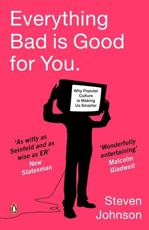
I've just completed reading the thesis by Steven Johnson "Everything Bad Is Good for You: How Today's Popular Culture Is Actually Making Us Smarter. "
In this book he describes how the sleeper curve that defines the increasing rise and complexity of popular culture is actually making us smarter. Rather than popular entertainment (films, DVDs, email, texting, instant messaging, computer games, and TV shows) dumbing us down, the effect is opposite. Johnson attempts to persuade us that the increasing complexity and multi threaded narratives that exisit in shows like 24 & lost, games like world of warcraft (WoW), simcity, and grand theft auto require greater congnitive processing than their forbears (Pacman, Starsky & Hutch, for example). The net effect of us being exposed to ever increasing multimodal channels of interactive edutainment is improving cognitive ability, he argues. It is a very persuasive arguement and makes great research for anyone interested in gaming/simulations for educational purposes.
As technology continues to influence our lives with us reading more from screen, writing more blogs and emails, we begin also to use hyperlinks as a mode of search strategy and information research. An attempt to define this new epedagody has emerged recently called connectivism.
I recently witnessed an undegraduate nursing student give a presentation using her eportfolio. She described quite matter of fact, how using hyperlinking to connect and display assessed pieces of work (reflective pieces) could not be achieved using traditional paper based portfolios. That was quite a eureka moment for me, when I witnessed first hand the difference between product & process. She was demonstrating that an eportfolio tool was not a mere product (like a VLE), it was enabling her to adapt a perfectly natural process of hyperlinking related education using an electronic eportfolio. The google generation that are comfortable with myspace & facebook, etc, routinely use hyperlinking in the creation of profiles and updates.
This also attempts to make sense of the use of 'tinternet for our primary mode of communication and research. Of course you can't beat a good book, and Johnson acknowledges the complete and total immersion that one experiences when engrossed in a good book. Of which most modern entertainment channels often miss out on. But, you try telling that to an online gamer who invests hours & hours & hours of time online (with friends) building characters abilities and learning the complex nuances of games like WoW. I love the types of open architecture of games like Halo 3 and Grand theft auto, and can become deeply engrossed, in a similar way to a good book. It's real escapism. As is a good film like Starwars or Lord of the rings. Both of which require a degree of concentration to follow complex intertwined characters and subplots.
Of course there are counter arguments that insist that the sheer volume and complexity of multimedia information at our finger tips, is proving too much for us to handle, evaluate and synthesise. The terminology Agnotology is used to describe this increased ignorance, proportional to the increase of (mis)information we have access to. I suppose that the rise of blogging of which we are all pseudo experts, exacerbated by casually linking to hastily scanned stories is part of this problem? Myself included! Yes, there is a definate power of the crowd mindset on the increase, proliferated by web 2.0 types of tools ( wiki, blogs, twitter, etc), but how accurate is it? The shear quantity information we can access is also compounded by new ways of accessing it (like the new Kindle ebook reader). But few web 2.0 contributors/authors are real experts? That's one of the main arguments against the reliance of user generated information repositories such a Wikipedia. Then again there's always RSS feeds and the semantic web which should help us filter and search information more efficiently?





No comments:
Post a Comment